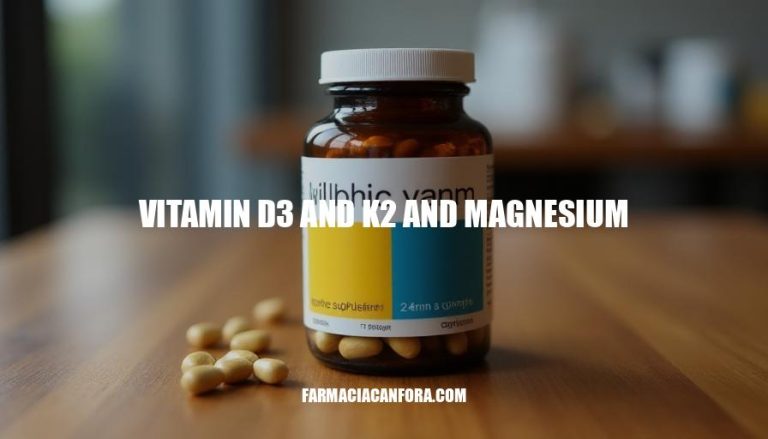


Vitamin D3, vitamin K2, and magnesium work together to keep your bones healthy. Vitamin D3 helps your body absorb calcium from food. But that’s not all – it also needs to be regulated so it doesn’t build up in the wrong places.
Vitamin K2 is a key player here.
It helps guide calcium to where it belongs: in your bones and teeth. At the same time, it prevents calcium from building up in your arteries.
Magnesium is another important part of this team. It helps turn vitamin D3 into its active form and supports calcium absorption.
Plus, magnesium itself is crucial for bone density – about 60% of the body’s magnesium is found in bones!
Together, these nutrients make sure your bones are strong, calcium is used efficiently, and you get overall health benefits.
Vitamin D3, vitamin K2, and magnesium work synergistically to support calcium metabolism, cardiovascular health, and overall well-being. Their combined use ensures optimal absorption, utilization, and regulation of calcium in the body, reducing the risk of deficiencies and associated health issues.
Vitamin D3: The recommended daily intake varies depending on age, health status, and sun exposure. For adults, a dosage of 1,000–4,000 IU per day is commonly suggested to maintain optimal blood levels of 25-hydroxyvitamin D.
Higher doses may be prescribed under medical supervision for individuals with deficiencies.
Vitamin K2: A daily dose of 100–200 mcg of menaquinone-7 (MK-7), a bioactive form of K2, is recommended. This ensures effective activation of proteins like osteocalcin and matrix Gla protein (MGP), which are crucial for calcium regulation.
Magnesium: The recommended daily intake for adults is 310–420 mg, depending on age and gender. Magnesium glycinate or citrate forms are often preferred for better absorption and minimal gastrointestinal side effects.
Calcium Absorption and Bone Health:
Vitamin D3 enhances calcium absorption in the intestines, increasing calcium levels in the bloodstream.
Vitamin K2 directs the absorbed calcium to bones and teeth by activating osteocalcin, reducing the risk of arterial calcification.
Magnesium is essential for activating vitamin D3 into its active form (calcitriol) and supports bone mineralization.
Cardiovascular Health:
Vitamin K2 prevents calcium from depositing in soft tissues and arteries by activating MGP, reducing the risk of vascular calcification and cardiovascular diseases.
Vitamin D3 and magnesium together help maintain healthy blood pressure and vascular function.
Reducing Deficiencies:
Magnesium deficiency can impair the activation of vitamin D3, leading to suboptimal calcium absorption and increased risk of bone and cardiovascular issues.
Vitamin K2 deficiency may result in improper calcium utilization, contributing to arterial stiffness and osteoporosis.
A study published in the Journal of the American College of Nutrition highlights the role of magnesium in activating vitamin D3 and its impact on calcium metabolism.
Research in the European Journal of Nutrition demonstrates the synergistic effects of vitamin D3 and K2 in improving bone density and reducing arterial calcification.
Clinical trials have shown that combining these nutrients significantly reduces the risk of osteoporosis and cardiovascular diseases compared to individual supplementation.
This combination offers a comprehensive approach to maintaining skeletal and cardiovascular health while addressing potential nutrient deficiencies.
Always consult a healthcare professional before starting any supplementation regimen.
1www.drberg.com2benefits-of-things.com3nutritional-supplements-directory.com
Vitamin D3 enhances calcium absorption, while vitamin K2 directs it to bones and teeth, preventing arterial calcification. Magnesium is essential for activating vitamin D3 into its active form and supports bone mineralization. This combination reduces the risk of deficiencies and associated health issues, such as osteoporosis and cardiovascular diseases.
It is essential to consult a healthcare professional before starting any supplementation regimen to determine the best course of action for individual needs. By acknowledging the interdependence of these nutrients and their positive impact on overall health, individuals can make informed decisions about their nutritional well-being.